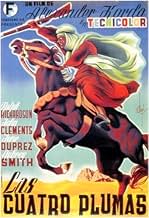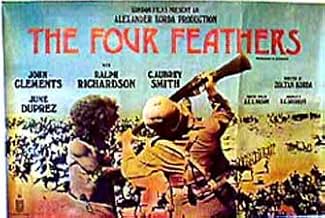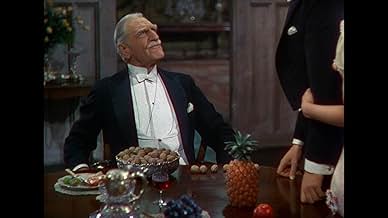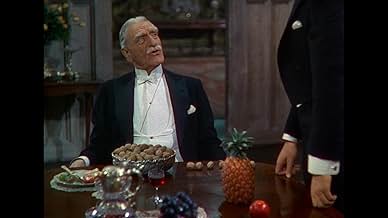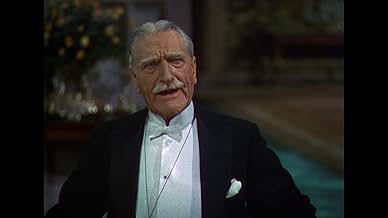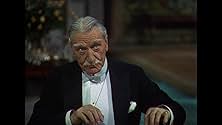A British Army officer resigns, burning his last-day summons to war in the Sudan. Accusing him of cowardice, his girlfriend and three friends give him white feathers. To gain redemption, he ... Read allA British Army officer resigns, burning his last-day summons to war in the Sudan. Accusing him of cowardice, his girlfriend and three friends give him white feathers. To gain redemption, he shadows his friends to save their lives.A British Army officer resigns, burning his last-day summons to war in the Sudan. Accusing him of cowardice, his girlfriend and three friends give him white feathers. To gain redemption, he shadows his friends to save their lives.
- Awards
- 1 win & 2 nominations total
- Man
- (uncredited)
Featured reviews
The Technicolor photography is eye-poppingly rich, at the same level as three other 1939 color classics—namely, Gone with the Wind, The Wizard of Oz and Drums Along the Mohawk. Particularly effective are the transitions from the browns and yellows of North African military outposts, with their punctuations by the red, white and blue of the Union Jack, to the deep greens of rural England. To top it off, much of the film was actually shot in the Sudan with what seems like thousands of native extras. By looks alone, sometimes it's hard to believe that this production predates the Second World War. It might have been a huge hit if it had had a Cary Grant or a Clark Cable or an Errol Flynn in the lead. As things go, John Clements is as good as can be, if not exactly bursting with charisma. Ralph Richardson gives a bravura performance as Clement's fellow officer, though he is saddled with a sequence that strains credulity beyond the breaking point. Let's just say that it takes a physically fit man longer than 30 seconds of direct exposure to the desert sun before he suffers total disorientation and unconsciousness. And if the sun can do that much damage so swiftly, then surely the flesh of the unconscious man's face, exposed for hours, would be cooked to a cinder.
C. Aubrey Smith plays his usual crusty old Brit, this time as a bombastic Crimean War veteran who complains that men are no longer men and war is no longer war. His repetitious boasting wears thin after a while. June Duprez barely registers as the female love interest.
But I'm not going to be internationalist about THE FOUR FEATHERS because this is a movie that makes you proud to be British , something that is sadly no longer allowed to happen these days . Perhaps the most stirring thing I can say about this movie is the way it wipes the floor with the contemporary competition that was coming out of Hollywood at the time . While the American studio were making similar monochrome movies with Errol Flynn and David Niven as the leads Ralph Richardson's performance alone is a reason to watch this movie and even if it wasn't there's still the story itself featuring themes like courage , honour , romance and redemption . You want battle scenes ? There's several in this movie as well choreographed as any thing seen in cinema at this time but perhaps the most what sets this British movie apart from other movies that were being produced across the pond is that it's a bit more gritty and sadistic than what Hollywood was producing . In one scene a British officer is flogged like a dog and he screams in pain as the camera pans on to the Mufti's face , a face lit up in sadistic glee , then the scene cross fades into a crowded dungeon where the prisoners are kept , a dark hell hole where the audience can actually taste the pain , fear and misery from the unfortunate prisoners . Even in those days Hollywood would pull their punches while a film like THE FOUR FEATHERSwould not
Sadly THE FOUR FEATHERS was released in 1939 which meant it qualified for the legendary Oscar ceremony the following year when GONE WITH THE WIND swept the board . A great pity because this very British movie deserved a hat full of awards . Sadly too Britain no longer has a film industry of its own and is reliant upon American finance , but perhaps the saddest thing is even if we did have a film industry no one in the business would want to film such an exciting historical epic in case they were labeled reactionary or racist
As in Stanley Baker's "ZULU" these giant black warriors are fearsomely portrayed with the scenes inside the primitive prison where the "dumb" spy Harry Faversham eventually finds himself are quite grim. And as another reviewer has commented, crusty Sir Aubrey as ever is the perfect & amusing retired tactician at the start & finish. A glare from under those bushy eyebrows was always enough! Great entertainment.
This is a wonderful British adventure film, equally on a par with anything Hollywood was to produce in that golden year of 1939. Shot in color, with spare-no-expense filming in the Sudan, THE FOUR FEATHERS is a paean to the glory days of Victoria's Empire & the men who fought to build it.
Sir John Clements is excellent as the young hero. Although virtually unknown to American audiences his entire career, Sir John was a very fine actor with a warmly distinctive voice which he uses here to advantage. Sir Ralph Richardson appears, terrific as always, as one of the friends; so does John Laurie, very good as the troublesome Khalifa. Sir C. Aubrey Smith, magnificent as a curmudgeonly old general, provides the final hurdle Sir John must jump to regain his reputation.
I believe that the main reason this film is not given more credit is that it happened to be made in the watershed year of 1939, a year of legendary films, filmmakers, and stars. (Think "Gone with the Wind" and "The Wizard of Oz", among others.) The action scenes are as good as you can get. The technical direction is well done and the cinematography excellent. While the camaraderie is, at times, a little forced, it is probably fairly accurate.
The travails of the protagonist are straightforward and unimpeded by the burdens of political overtones or ethereal punishments for current retrospections on political transgressions and apologetic political correctness. I'll forego the 5.1 surround sound for the far better entertainment factor of the real "Four Featers" made in 1939
Did you know
- TriviaDirector Zoltan Korda's own remake of this film, Les 4 plumes blanches (1955), re-used a lot of the battle sequences from this movie, which did not lend themselves very well to the cropping necessary to achieve the width of the CinemaScope ratio, nor did their comparative fuzziness blend well with the new footage.
- GoofsWhen General Burroughs is talking in the garden with Ethne, his swagger stick reverses ends.
- Quotes
Harry Faversham: In England, the white feather is the mark of a coward.
Dr. Harraz: Ah, I see. Then why worry? Be a coward and be happy.
Harry Faversham: No, Doctor. I have been a coward, and I wasn't happy.
- Crazy creditsOpening credits prologue: In 1885 the rebellious army of cruel dervishes enslaved and killed many thousands of defenceless natives in the Sudan, then laid siege to Khartoum. The scanty garrison's heroic commander, General Gordon appealed for help from England - but no help reached him.
- ConnectionsEdited into Les 4 plumes blanches (1955)
- SoundtracksAuld Lang Syne
(1788) (uncredited)
Lyrics by Robert Burns, music traditional
Heard during the departure of the Regiment
Details
- Release date
- Country of origin
- Language
- Also known as
- Les 4 plumes blanches
- Filming locations
- Production company
- See more company credits at IMDbPro
- Runtime
- 2h 9m(129 min)
- Aspect ratio
- 1.37 : 1


